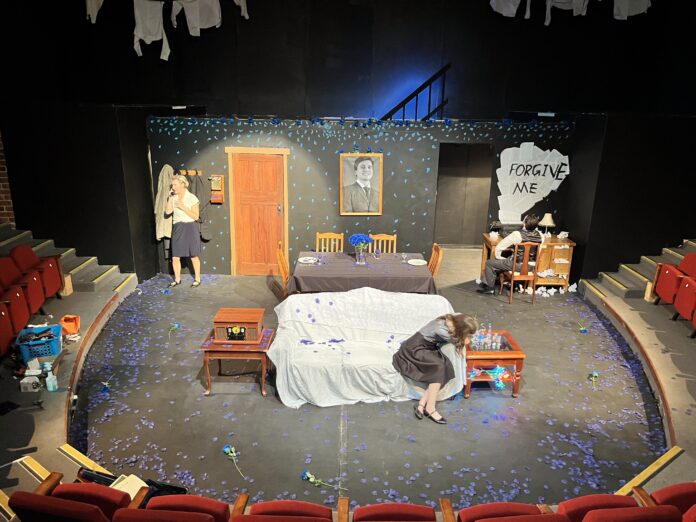I find it both interesting and encouraging to witness just how young actors and a novice production crew operating under a first time director bring a play script to the stage. In this instance it’s Tennessee William’s much vaunted “The Glass Menagerie” that provides the challenge. And I must say, at the end of the night, the challenge is pretty well met. First time director Clinton Nitschke has some strong and passionate views about the piece and he boldly puts those ideas to work in this production. The active word in that sentence is “work”, and in my opinion some ideas do work and some do not. Nitschke highlights the natural stand out symbols very well. The collection of glass animals, the menagerie, is always in focus. The fire escape stairwell/landing is also used to great effect especially as a rostrum from which narrator Tom addresses us directly. It is interesting that Tom’s mother Amanda only ventures into that space but once whilst sister Laura makes an attempt to negotiate the climb but struggles to complete the challenge it proves for her. Director Nitschke has his cast make effective use of the playing space overlooked by a large framed photograph of the long gone runaway man of the house, Amanda’s feckless alcoholic husband and father of both Tom and Laura. The stage setting is redolent with numbers of blue rose petals in a manner I consider far too heavy handed. I also found the “Forgive Me” graffito scrawl above the typing desk an unnecessary and odd distraction. It doesn’t fit either with the ethos of the play nor with any of the characters therein. The lighting plot needs a good tweak as some playing areas are underlit and I would just omit the blood red filter usage. Similarly there was some musical (solo piano) underscoring which I thought detracted from the far more important dialogue being delivered simultaneously. Maybe a quieter more subtle effect can be considered at those times? The timelessness of this play lies in its language and the poetry associated with the familial exchanges, stories of recollection especially those recounted by both Tom and his mother Amanda as they struggle to make sense of what they have, what might have been and the constant need to keep going amid dire times.
So to the performers. Mia Livingston-Pearce’s portrait of Laura is nicely drawn. She is spoken at rather than to, certainly by her mother. Her rather cowed demeanour fits her like a glove. To continue with that analogy, she wears her shyness on her sleeve and aptly demonstrates how a complete absence of self-assuredness can easily slip into panic mode. Livingston-Pearce’s interaction with dinner guest Jim in the second act presents a moment where she just might be able to express ideas and thoughts we suspect she has. But to no avail. Her physical acting and movement is good but vocal projection could be turned up a notch. A nicely balanced performance.
Liam Warmeant plays “gentleman caller” Jim in a manner Americans would call a “regular guy”. A bit of a joker, a sporty fellow that Tom looked up to at school and the boy his sister had a crush on, unbeknown to anybody. Jim, the good communicator who has a penchant for giving others nicknames, “Blue Roses” for Laura whilst at school and “Shakespeare” for Tom for his urge to write poetry in the workplace. He uses the stage with confident ease although his dance with Laura, an important iconic moment in the play, is completely artless. Need it look so clumsy? Should he not hold her in the right manner at least? Warmeant has a pleasing voice and confident stage presence and injects his character with the right amount of social grace, charm and sincerity. His apologetic awkwardness after his spontaneous kiss with Laura is an apt well judged and understandable reaction to his behaviour.
Connor Duncan is a most believable and convincing Tom. We accept the tale he has to convey about his family and their circumstances. We witness his prickly, sometimes fiery, interactions with his mother and his kinder, measured communication with his sister. We understand his long and constant battle to break away and find the adventure he sees in the movies, dreams about and writes about. Duncan’s transition from soliloquy to stage participation is handled with ease. He too has a good voice, uses the stage very well and plays Tom with a nice balance of resignation, doubt and ultimately optimism. His final speech carries the weight of guilt born of abandoning his fragile sister at such a difficult time. But is there ever the right time to make the decision to leave and move on? He finds, as we all do, that wherever you go you take yourself along too! Duncan delivers a worthy performance in a key role.
I consider that in such a role for a young actor to get her head around, Jessica Merrick produces an exemplary performance as Amanda. I always have initial misgivings about the use of an accent but Merrick serves up a consistent Southern tinged delivery. (Actually, accents work well with each of the cast members. Nothing grates or seems to wander too far!) Amanda’s clashes with her son, her constant cajoling of her daughter and her delightfully flirtatious interaction with dinner visitor Jim are all thoughtfully shaded and executed in a professional manner. Her stories, oft told recollections and the manner in which they are delivered are at times quite delicious. An excellent piece of acting.
For me this staging of “The Glass Menagerie” was at its best when each of the players was communicating or attempting to communicate with each other. Simply put it is what I believe the playwright is totally focussed on. A family group, with a solitary outsider thrown briefly into the mix, doing what they need to do in order to get on with their lives and cope with everyday difficulties and challenges.



